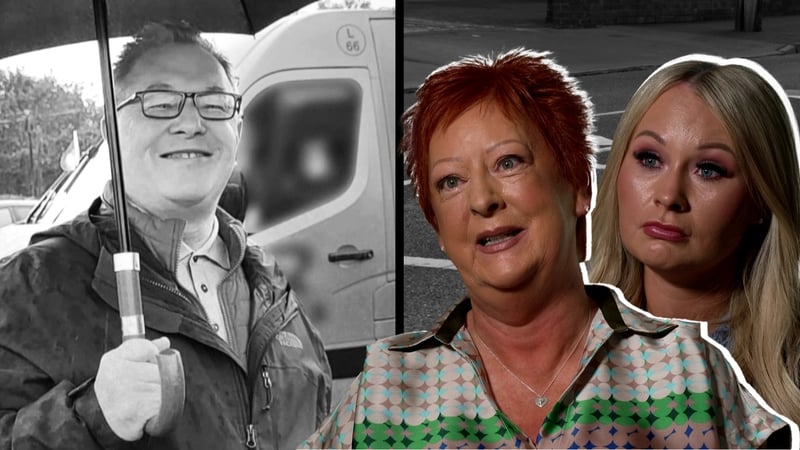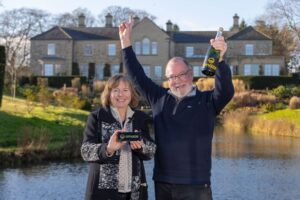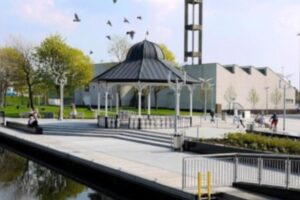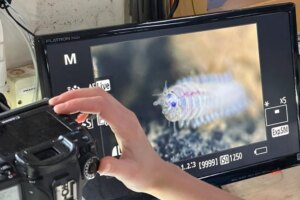
Derek Doyle was cycling home from his job as an usher at Leinster House just days before Christmas last year when he was struck and killed by a left-turning truck in Castleknock, Co Dublin.
In their first interview since his death, Derek’s wife Tania and daughter Hazel-Lynn say they believe urgent action is needed to improve cycling infrastructure and to reduce the danger Heavy Goods Vehicles (HGVs) pose to cyclists.
While there is an ongoing garda investigation into the circumstances surrounding Derek’s death, his family say that they know he was cycling through Castleknock village when he collided with a truck turning left onto College Road.
According to Tania, an independent councillor on Fingal County Council, “Derek was cycling through the junction and was hit by a lorry. And he was run over on his bicycle and found under the left-hand wheel of the lorry.”
Derek’s body was so badly damaged in the crash that it was ten days before his body could be formally identified.
Derek pictured with his daughter Hazel-Lynn
Hazel-Lynn had to provide a lock of hair and a saliva sample so a DNA match could be made – “something that will never leave me,” she said.
“To have to give a piece of yourself to identify your dad is something nobody should ever have to do.”
“We had to have a closed coffin. So, we never got to say goodbye,” Tania added.
Derek’s route home from work through the city centre and the Phoenix Park is well served by protected cycle lanes.
But in Castleknock village the protection ends, with an unprotected lane leading to the junction where he was killed – a tight left turn onto College Road that is particularly difficult for large vehicles.
Tania believes the junction where Derek died needs to be made safer for cyclists and that the route is unsuitable for HGV traffic.
There is a “stop box” for cyclists at the traffic lights, which Tania says is frequently encroached upon by cars, vans and other vehicles.
When Prime Time monitored the junction on 29 August, the majority of traffic stopping at the lights was observed doing exactly that.
One truck driver was seen struggling to make the tight left turn onto College Road, mounting the footpath as he did so.
Derek served with the Defence Forces in Lebanon.
Derek, who was in his 50s, met his wife Tania when they were both 16. He joined the army at 18, went on to serve in Lebanon, and later joined the Irish Air Corps, where he also worked on the government jet.
Hazel-Lynn said that as a military man, her father “did everything by the book.” He was “lit up like a Christmas tree” when he cycled and stopped for every red light.
She feels he was doing everything he was supposed to do but was still left exposed by infrastructural shortcomings.
“They want you to be fit for the economy and use cycle to work scheme, [but] roads have to be safe. If the roads aren’t fit for purpose and the infrastructure isn’t fit for purpose, look what’s happening.”
In the first seven months of this year, eight cyclists have been killed on Irish roads, up from six in the same period last year, and from just two in both 2022 and 2023.
While overall road deaths are down on 2024, cyclist fatalities have continued to climb.
Fingal County Council said it carried out a standard collision report after Derek’s death and concluded the junction is safe for all road users.
The council said it has no plans to make changes to the junction or to restrict HGVs from the route.
Derek met his wife Tania when they were both 16 years old.
While the exact circumstances of Derek’s death have yet to be fully established, the family also point to measures taken in other countries to eliminate blind-spots for truck drivers, a particular danger for left-turning HGVs.
Trucks with blind spots that can leave cyclists or pedestrians completely invisible to drivers have been effectively banned from the city of London, with only modern cabs or those retrofitted with sensors and cameras allowed to drive on the roads.
Cyclists in green are visible without a Camera Monitoring System (CMS); those in red are not. With a properly specified CMS, all cyclists shown become visible to the driver. Image: Transport for London.
There are no plans to introduce similar regulations in Ireland, though new European Union rules will prohibit the sale of new HGVs with blind spots from 2029 onwards. But Tania believes far more needs to be done.
“Trucks on the road need to be safe. If there’s blind spots, in particular on the left-hand side, your truck is not safe. And if all it takes is to put extra sensors on the side of the truck, and particularly on the front of the truck as well, that’s not a big deal.”
Tania says that their family have been “in a black hole” since Derek was killed, “trying to deal with the trauma and then the grief”Hazel-Lynn says that no other family should have to go through what they’re going through.
“We’re reliving what’s happened every day. I feel like I’m hamster on a hamster wheel, and I’m running around. But there’s no end. It’s not life without Dad. It’s not.”
The full report from Conor Wilson and Sallyanne Godson airs on the 4 September edition of Prime Time, 9.35pm on RTÉ One and the RTÉ Player.





